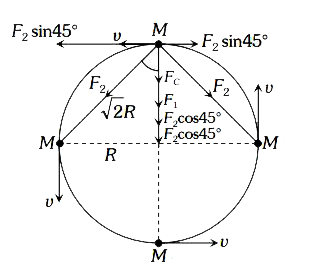Four identical particles of equal masses 1kg made to move along the circumference of a circle of radius 1 m under the action of their own mutual gravitational attraction. The speed of each particle will be :
√G2(2√2−1)
√G(1+2√2)
√G2(1+2√2)
√(1+2√2)G2
The correct Answer is:D
 implies By resolving force F2, we get
implies By resolving force F2, we get
⇒F1+F2cos45∘+F2cos45∘
⇒F1+2F2cos45∘=Fc
Fc = centripetal force = Mv2R
⇒GM2(2R)2+⎡⎢
⎢
⎢⎣2GM2(√2R)2cos45∘⎤⎥
⎥
⎥⎦=Mv2R
⇒GM24R2+2GM22√2R2=Mv2R
⇒GM4R+GM√2.R=v2⇒v=√GM4R+GM√2.R
⇒v=
⎷GMR[1+2√24]
⇒v=12√GMR(1+2√2)
(Given : mass = 1kg, radius = 1m)
⇒v=12√GMR(1+2√2)
Similar Questions
Two particles of equal mass move in a circle of radius r under the action of their mutual gravitational attraction. Find the speed of each particle it its mass is m.
View SolutionTwo particles of equal mass move in a circle of radius r under the action of their mutual gravitational attraction. Find the speed of each particle it its mass is m.
View SolutionFour identical particles of equal masses 1kg made to move along the circumference of a circle of radius 1 m under the action of their own mutual gravitational attraction. The speed of each particle will be :
View Solutionचार कण, प्रत्येक का द्रव्यमान M है, अपने पारस्परिक गुरुत्वीय आकर्षण की क्रिया के तहत R त्रिज्या के एक वृत्त के अनुदिश गति करते हैं। प्रत्येक कण की चाल क्या है?
View SolutionFour particles of mass M move along a circle of radius R under the action of their mutual gravitational attraction. The speed of each particle.
View SolutionTwo particles of equal masses move in a circle of radius r under the action of their mutual gravitational attraction. Find the speed of each particle if its mass is m
View SolutionTwo particles of equal mass m each , go round a circle of radius R, under the action of their mutual gravitational attraction. The speed of each particle is
View Solution_S01_003_Q01.png)
Two particles of equal mass (m) each move in a circle of radius (r) under the action of their mutual gravitational attraction find the speed of each particle.
View Solution

